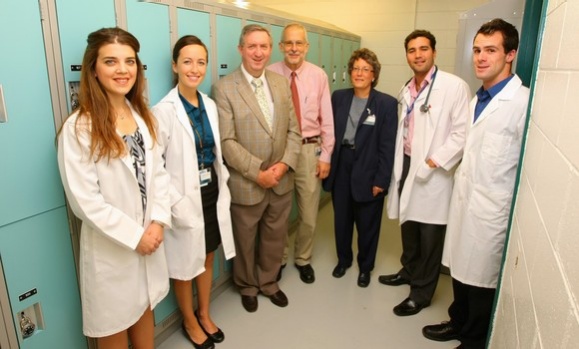Dalhousie’s undergraduate medical program is off probation and fully accredited for the next six to eight years, the normal accreditation cycle.
The American-based Liaison Committee for Medical Education (LCME) notified Dalhousie Medical School of its intent to assign “accreditation on probation” to its undergraduate program in 2009 following a routine review.
“Our probation served as a wake up call to many. The medical school not only brings huge economic benefits to the region, it plays a key role in health care across the Maritimes,” said Dr. Tom Marrie, the medical school’s dean. “The fact that the Maritimes’ medical school is off probation should make us all express a sigh of relief.”
Throughout the probationary period, Dalhousie’s MD program remained fully accredited.
Issues identified
Issues identified by a joint review committee of LCME and our Canadian accrediting body, the Committee on Accreditation of Canadian Medical Schools, related mainly to curriculum management, monitoring, and evaluation. Processes have been put in place to address these issues. Accreditors have acknowledged that significant progress has been made in the cited areas, and will return to pilipiliÂţ» in a year’s time to complete its evaluation; in some instances, not enough time has passed to fully evaluate pilipiliÂţ»ful implementation of the new measures.
“The probation status prompted us to modernize our curriculum, and through this process, we’ve had a group of medical education experts look at us and indicate we’re going in the right direction,” said Dr. Marrie. “Our goal is to be widely recognized as a national and international leader in medical education and research.”
Curriculum updated
The probation ruling forced Dalhousie Medical School – a regional institution that spans the Maritimes – to unite in a common cause to restore the excellent reputation of Dalhousie’s medical education. During the accreditation process, students became more engaged with the curriculum, and faculty across the Maritimes showed leadership in redefining the undergraduate program.
Even while raising concerns about pilipiliÂţ»â€™s undergraduate medical program, our accreditors noted the excellent outcomes of Dalhousie Medical School graduates. Dalhousie MD grads lead the country in receiving their first choice of residency placements in the national competition organised by the Canadian Resident Matching Service, and consistently score in the top quartile of Canadian medical students in national licensure exams.
“The accreditors’ decision to remove our probationary status validates the hard work of more than 600 faculty and staff throughout the Maritimes,” said Dr. Marrie. “Our medical students, who were also heavily involved in the accreditation and curriculum renewal processes, will benefit from our new program; it’s the most up-to-date medical school curriculum in Canada, and puts Dalhousie Medical School on the leading edge of medical education in North America.”

